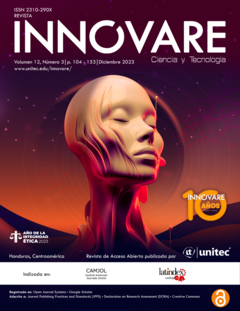Shabat en la oscuridad: la observación participativa como una herramienta de construcción relacional en la investigación cualitativa
DOI:
https://doi.org/10.5377/innovare.v12i3.17169Palabras clave:
Análisis cualitativo, Honduras, Judaísmo, Minoría religiosa, ObservaciónResumen
Introducción. Existe un vacío en el estudio de la identidad hondureña y su relación con la religión. Por ejemplo, el judaísmo es frecuentemente marginalizado y fetichizado en una sociedad derivada de la hegemonía cristiana. Presentación de experiencia. La epistemología standpoint y la observación participativa fue utilizada para investigar la comunidad judía ortodoxa en una sinagoga en San Pedro Sula, Honduras. Se realizaron observaciones participativas al servicio de Shabat, mediante rituales que involucraron a mujeres de la comunidad. Se recolectó información por medio de la experiencia y la conversación. Discusión. Los rituales y prácticas son fundamentales para todas las religiones. En la comunidad judía ortodoxa estudiada, se ha convertido en una piedra angular. El deseo de cumplir la ley religiosa fue lógico en un contexto donde la observancia fue la única conexión con la identidad judía. Conclusión. El valor de la epistemología standpoint se confirma mediante la profundidad de la información obtenida por la invitación de unirse al servicio de Shabat y el nivel de involucramiento permitido. En esta instancia, la observación participativa se convirtió en una herramienta para establecer la confianza. En esta primera vista, se facilitó el intercambio de información y un punto para un futuro contacto.
Descargas
1307
PDF 193
HTML (English) 152
PDF (English) 154
Descargas
Publicado
Cómo citar
Número
Sección
Licencia
Derechos de autor 2023 Luisa Adriana Cook Alvarado, Astrid Karolina Madrid Banegas

Esta obra está bajo una licencia internacional Creative Commons Atribución-NoComercial-SinDerivadas 4.0.




